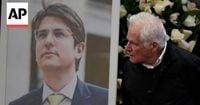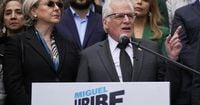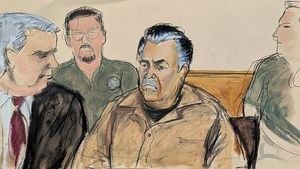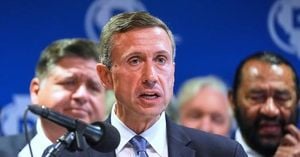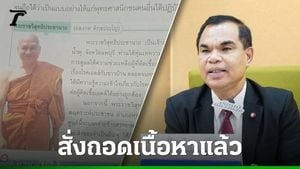On August 26, 2025, the heart of Colombia’s political landscape was jolted by an emotional and unexpected announcement. Miguel Uribe Londoño, a 72-year-old former senator and father of slain presidential candidate Miguel Uribe, declared his intent to run for the presidency. The declaration, made in front of the congressional building in Bogotá, was as much a personal act of mourning as it was a political gambit—an effort, as he put it, to keep his son’s legacy alive and to steer Colombia toward a safer, more united future.
Uribe Londoño’s announcement came just months after the tragic assassination of his son, Miguel Uribe, during a political rally—a killing that sent shockwaves across the nation and left many Colombians reeling. The elder Uribe, speaking behind a podium emblazoned with his son’s campaign logo, addressed a crowd that was as much in mourning as it was in anticipation. According to the Associated Press, he began with a vision: “Together we can build a secure Colombia where people will not fear going out into the streets, and where business owners will not have to make extortion payments to gangs.”
He continued, emphasizing the need for unity in a country often riven by social and political divides. “A democratic Colombia, where the government does not foment divisions between the rich and the poor, whites or Blacks, or those who are on the left or on the right,” he declared, drawing applause from the assembled supporters and passersby. The speech was not just a campaign launch—it was a call for healing, and a pointed critique of the current administration under President Gustavo Petro.
Uribe Londoño is no stranger to Colombian politics. He served on Bogotá’s city council in the late 1980s and was a senator for the Conservative Party in the early 1990s. Yet, until the death of his son, he had largely receded from the national spotlight. As reported by Arab News, he had no plans to run for the presidency and was not widely recognized by the general public. All that changed after the nationally televised funeral of his son, where his impassioned eulogy—decrying what he called the country’s descent into “madness” under the current left-wing administration—captured the attention of a grieving nation.
Now, Uribe Londoño is one of five candidates vying for the nomination of the Democratic Center, the conservative party his son once championed. The party, according to both AP and Arab News, intends to use opinion polls later this year to select its final candidate. The Democratic Center itself has been struggling to find a unifying figure as its leader, former President Álvaro Uribe (no relation), faces ongoing corruption allegations in the courts.
Sergio Guzmán, a political analyst based in Bogotá, told AP that Uribe Londoño’s entry “reinvigorates” the party. “He symbolizes the pain of many victims, especially those who are conservatives,” Guzmán observed, referencing the personal tragedies that have marked Uribe Londoño’s life—not only the loss of his son, but also the murder of his wife in the 1990s. For many, his candidacy is a living testament to the suffering that violence has inflicted on Colombian families across generations.
Violence, indeed, is at the center of Colombia’s current political crisis. The country is facing what many describe as a new wave of bloodshed, largely fueled by rebel groups and drug gangs eager to seize control of territories abandoned by the FARC (Revolutionary Armed Forces of Colombia) after the 2016 peace deal. In just the week preceding Uribe Londoño’s campaign launch, a FARC holdout group detonated a car bomb outside a military base in Colombia’s third largest city, killing seven people. Meanwhile, in the province of Antioquia, rebels shot down a helicopter involved in anti-narcotics operations, resulting in the deaths of 13 police officers.
President Gustavo Petro, whose administration has been the target of Uribe Londoño’s sharpest criticisms, has attempted to broker peace with the country’s remaining armed groups. He has granted ceasefires in hopes of advancing negotiations, but, as critics argue, these efforts have produced limited results and may have inadvertently strengthened the rebels’ position. As Arab News reported, many in the opposition see the current government’s approach as dangerously naive, accusing it of allowing criminal organizations to regroup and expand their influence.
Uribe Londoño’s campaign, then, is as much a response to this climate of insecurity as it is a personal journey. “I am not the only father who has lost that which he loved the most,” he said on Tuesday, his voice steady but heavy with emotion. “But I would like to be the voice of the latest father, who has had to accept the cruel destiny that they want to impose on us with violence and terror.” The statement, reported by both AP and Arab News, resonated deeply with many Colombians who have lost loved ones to the nation’s seemingly endless cycle of violence.
The political implications of Uribe Londoño’s entry into the race are significant. For the Democratic Center, his candidacy may offer a rare opportunity to rally both traditional conservatives and those disillusioned by the current state of affairs. For the broader electorate, his campaign could serve as a referendum on the effectiveness of President Petro’s peace initiatives—and on the country’s willingness to confront its violent past head-on.
Yet, Uribe Londoño faces formidable challenges. He is entering a crowded field, and his late arrival means he must quickly build national recognition and a campaign infrastructure capable of competing with more established rivals. The Democratic Center’s reliance on opinion polls to select its nominee adds another layer of unpredictability, especially in a political environment where public sentiment can shift rapidly in response to new outbreaks of violence or political scandal.
Still, his message—rooted in personal loss and a desire for unity—has struck a chord with many. As Colombia approaches its next election cycle, the question remains: can a father’s grief and determination galvanize a country weary of bloodshed and division? Or will the old patterns of violence and political fragmentation prove too deeply entrenched to overcome?
For now, Miguel Uribe Londoño stands as a symbol of both the pain and the hope that define Colombia’s present moment. His campaign, born from tragedy, has already begun to reshape the conversation about what kind of future Colombians want for themselves and for generations yet to come.
